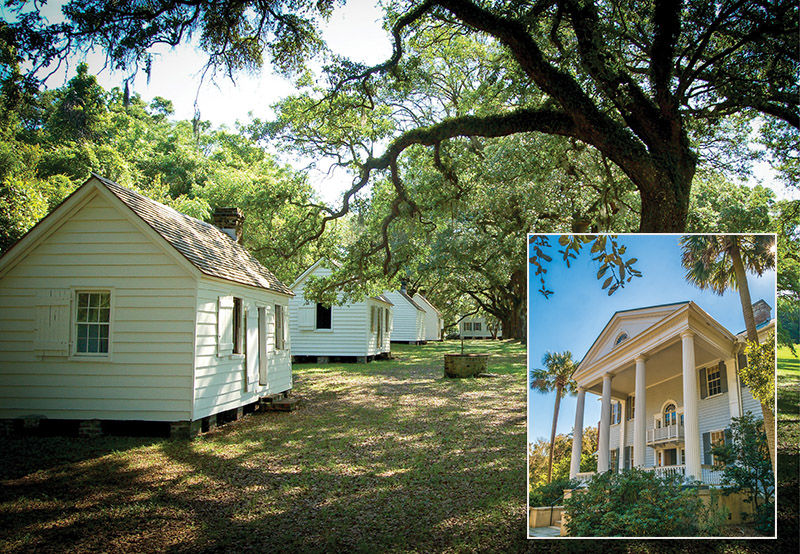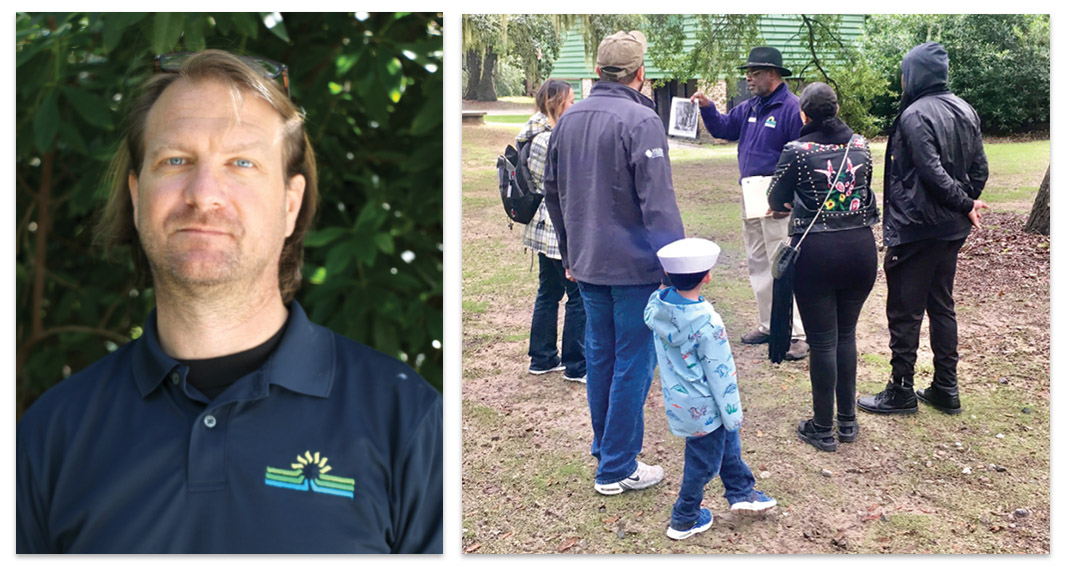The plantation was recently named an "International Site of Conscience"

James Island’s McLeod Plantation, a former sea island cotton plantation established in 1851, was recently designated as a ”Site of Conscience“ for its efforts to interpret history and stimulate dialogue on social issues.
When a former Colorado political candidate and activist Tweeted a screenshot of a negative review of McLeod Plantation last summer, the post went viral and elicited a heated response. “We didn’t come to hear a lecture on how the white people treated slaves, we came to get this history of a southern plantation,” the original complaint read. The Washington Post followed with an article about the review and similar comments about plantation tours across the South with the headline: “Some white people don’t want to hear about slavery at plantations built by slaves.” But for Shawn Halifax, head of historical interpretation at the Charleston County Parks and Recreation Commission (CCPRC), which owns McLeod, such commentary proves how vital his work remains.
Halifax and his colleagues have been at the forefront of an effort to shift the dialogue away from glossy plantation romanticism to the real lived experience of those who owned the land and the enslaved people who worked it. Of course, he hopes visitors appreciate exploring the 37-acre former cotton plantation with its cinema-worthy oak allée. But, more importantly, Halifax wants them to walk away with a historically accurate perspective of enslaved African Americans who worked there—an understanding that’s more crucial in light of the resurgence of white supremacy in America as evidenced by the shooting deaths of nine African Americans at Emanuel AME Church.
“The events of June 2015 forced us to look more critically at the work we were doing and its implications,” said Halifax, who has worked to interpret history for years, first at Middleton Place and for 17 years at CCRPC. “Seen through the lens of Mother Emanuel, this is an educational effort related to social justice.”
The Gullah Geechee Heritage site’s 45- to 60-minute guided tours focus on the lives of the enslaved, specifically their transition to freedom. John Gardner, a Beaufort County native of Gullah Geechee descent, leads tours at McLeod and can attest to the impact of his role. “A lot of the history I’m conveying, I grew up with,” he says. “It’s rewarding to see visitors’ reaction to the information I share with them. A lot of them had no understanding of what slavery really was; it’s been buried and hidden in their education, and their becoming aware is sometimes very surprising.”

(Left) Shawn Halifax is head of historical interpretation at CCPRC; (Right) John Gardner leads a tour at McLeod Plantation.
McLeod’s commitment to illuminating the past has earned recognition on a global level. Last November, McLeod Plantation and Caw Caw Interpretive Center, also a CCPRC property, were accepted into the International Coalition of Sites of Conscience. They join a network of 275 historic sites and museums across 65 countries that work to prevent erasure of past struggles in order to ensure a more just future. Other coalition members include the Statue of Liberty and Ellis Island, the Atlanta History Center, Auschwitz Institute for Peace & Reconciliation, and the Wing Luke Museum of the Asian Pacific American Experience.
“McLeod is at the trending edge, and the lessons they are learning will be important and impactful for any site that is talking about race and minorities and descendent communities,” says Dina Bailey, the coalition’s director of methodology and practice.
Committed to developing best practices for collaborative storytelling, Halifax—along with colleagues Tracy Todd, director of Middleton Place, and Lee Pringle, founder and artistic director of the Colour of Music Festival—participated in the 2018 inaugural National Summit on Teaching Slavery at James Madison’s Montpelier (also a Site of Conscience). Out of that effort, Halifax helped author a model for engaging descendent communities when teaching slavery to construct richer, more inclusive narratives and to reimagine what a place like McLeod can be. “Can it be a place where much needed conversation of race and race relations can occur? A place where healing can occur?” he asks.
A central question for Halifax and his colleagues is how to share authority. “We don’t want the institution leading the effort, but the institution and descendent community to be equal collaborators,” he says, pointing to the Poetry at McLeod series as a platform for African American poets to share their voices in this historic setting. “The voices coming out of McLeod today can’t just be CCPRC voices, they have to be all voices.”
-------
Ukweli is Swahili for Truth. This poetry, lecture, and dialogue series seeks healing truth. Poet and writer Horace Mungin will read his poetry in a place where his ancestors were enslaved, and readings will be followed by black scholars and authors who contextualize the poems. Discussions moderated by Osei Chandler. All programs are 1 to 2:30 p.m.
MARCH 7
A Dark Darkness: Mungin's poems "Khadija" and "The Lashing of Patsey of Bayou Boeuf Plantation" with discussion led by author Herb Frazier.
MARCH 28
Black Women in History: Mungin's poem "Ain't I a Woman" borrows its title from Sojourner Truth's famous 1855 speech. Dr. Karen Meadows leads the discussion.
APRIL 11
The Dehumanization of Africans in America and Jim Crow. Discussion led by historian Damon Fordham.
APRIL 25
The Bible and the Rope: Mungin's "Red Summer of 1919" sets the tone and speaker Imam Hakim Abdul Ali leads the discussion.
MAY 16
Establishing the Literary Link: Mungin's poem "God's Pen in Their Hands" presents Black women who used the power of the pen as resistance, with Yvette Murray leading the discussion.